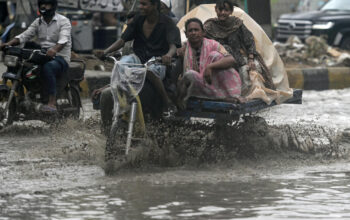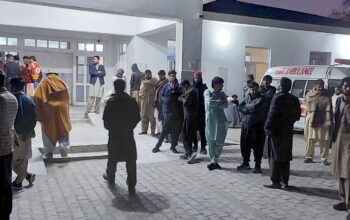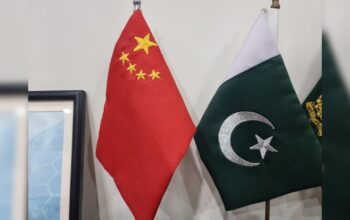By Staff Reporter
ISLAMABAD: Prime Minister Shehbaz Sharif on Wednesday called for a comprehensive dialogue with India to address longstanding disputes over Kashmir and water rights, as a fragile truce holds between the nuclear-armed neighbours following recent military clashes.
Speaking at the Pasrur Cantonment near the Indian border in Sialkot, Sharif praised the armed forces for their response to Indian strikes in a retaliatory operation earlier this month.
The operation Bunyanum Marsoos took place May 6-7, targeting 26 Indian military sites, including airbases, with jets, drones and missiles. Pakistan said it had downed several Indian Rafale aircraft.
The strikes followed India’s incursion into Pakistani territory, which New Delhi justified as a response to the April 22 Pahalgam attack that killed 26 people. The Pahalgam attack, still unclaimed, has intensified the conflict. India accused Pakistan of involvement and launched retaliatory strikes, a charge Islamabad rejects. Sharif offered a neutral investigation into the incident, which India declined.
Sharif hailed the operation as a historic success. “History will eternally record how, within a few hours, Pakistan’s defenders extinguished India’s unprovoked aggression with unmatched precision and resolve,” Sharif told troops during his address. He framed the response as a long-awaited reckoning, declaring, “You have taken revenge for the 1971 war…and now the whole nation is standing with you.”
Sharif’s call for talks came with a warning to Indian Prime Minister Narendra Modi. “If you again attack us, you will lose everything…We are ready for war and peace. Choice is yours.” “Let it be clear: we are fully prepared for both peace and war.”
The prime minister accused India of escalating tensions, particularly over the Indus Waters Treaty, a 1960 pact governing river sharing. India’s recent decision to suspend the treaty, condemned by Pakistan as illegal, followed the Pahalgam attack. World Bank President Ajay Banga last week said the treaty allows no unilateral suspension, requiring mutual agreement for changes.
Water remains a flashpoint. Sharif accused India of targeting the Neelum-Jhelum hydropower project, though he said damage was limited.
“Do not dictate us. Water is our red line; don’t even think about diverting our water. Yes, water and blood do not flow together. You have also hit our Neelum-Jhelum water project. If the damage was severe, we could have destroyed your major dams, including Baglihar Dam.”
The two nations, which have fought three wars, have seen decades of hostility over Kashmir, claimed by both but divided between them, and resource disputes.
Sharif emphasised Pakistan’s commitment to peace while vowing to defend its sovereignty. “We’ve shown restraint,” he said, noting that a more severe counterstrike on Indian dams like Baglihar was avoided.
“Let us extinguish this fire. Let us sit together to talk on Kashmir and water,” Sharif addressed his Indian counterpart.
During his Sialkot visit, Sharif received a detailed briefing on the military operation and met with officers and soldiers involved. He is set to visit air and naval bases in the coming days to rally troops from the Pakistan Air Force and Navy.
“Pakistan had agreed to the ceasefire understanding in the larger interest of peace in the region,” Sharif said, reaffirming the country’s commitment to stability. “We reaffirm our strong resolve to promote peace in South Asia, while defending our sovereignty and territorial integrity at all costs.”
In a gesture of restraint, Pakistan on Wednesday returned a captured Indian border guard, Purnam Kumar Shaw, to India. Shaw had been held by Pakistan Rangers since April 23, a day after the Pahalgam attack. India’s Border Security Force confirmed the handover in a statement reported by AFP.
Copyright © 2021 Independent Pakistan | All rights reserved




